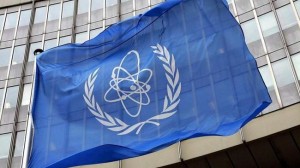 As the clock ticks down on the July 20 target date for sealing a comprehensive nuclear agreement with Iran, there is growing focus on the willingness of the two key players � Tehran and Washington � to make compromises needed to cut a deal.
As the clock ticks down on the July 20 target date for sealing a comprehensive nuclear agreement with Iran, there is growing focus on the willingness of the two key players � Tehran and Washington � to make compromises needed to cut a deal.Yes, European Union foreign policy chief Catherine Ashton is chief negotiator for the six countries that negotiate with Iran and plays a significant coordination role with Iran. And yes, any deal resolving the conflict over Iran�s nuclear ambitions must be signed off by all six countries, which include France, Britain and Germany as well as the U.S., Russia and China.
But for many observers, Europe is a serious but marginal player in the efforts to strike an agreement.
In a report due to be published on Tuesday, Ellie Geranmayeh, a visiting fellow at the European Council on Foreign Relations, seeks to redress that.
She sketches out how EU countries can maximize leverage to help tip talks toward a successful conclusion.
Ms. Geranmayeh�s premise is that a nuclear deal with Iran is overwhelmingly in Europe�s interest. A deal, she believes, would reduce the threat from nuclear proliferation, prevent the �disaster� of military escalation, warm economic ties with Iran and allow Europe to engage Tehran on regional security threats like Syria and combating Al-Qaeda.
�Europe�s overriding strategic interest is to find a solution to Iran�s nuclear program that limits its [nuclear weapon] breakout capability to an acceptable timeline�while avoiding a Western-led or Israeli military strike against Iran�s nuclear facilities,� she writes.
Iran denies it is seeking nuclear weapons, saying its program is purely for civilian purposes. However last month, U.S. Secretary of State John Kerry said Tehran is thought to be around two months away from assembling enough nuclear material to fuel a bomb. Western diplomats hope a final deal could push that �breakout time� back to a permanent minimum of at least six months.
Ms. Geranmayeh identifies the role she believes Europe should play in four different scenarios.
1)����� If a final deal is agreed by July 20, Europe should move quickly to ease sanctions on Tehran, she says. Most experts believe economic restrictions will be phased out over several years and diplomats say the process will likely take longer in the U.S. where a skeptical Congress must back the move. Europe has more flexibility to front-load the sanctions relief. The EU should also be ready to work immediately with Tehran to wind down the bloody conflict in Syria, she says.
2)����� If, as appears increasingly likely, Iran and the six powers agree to roll over the deadline by six months, she believes Europe could help maintain momentum by offering some modest sanctions easing to Iran. Tehran won economic incentives worth around $7 billion by signing onto last November�s interim deal but Ms. Geranmayeh says Washington may be reluctant to offer anything new with mid-term elections coming up in November. Europe could offer Tehran a sweetener to show Iran it didn�t wind back some of its activities under November�s interim deal for no reason.
3)����� If talks fall apart in coming months, �Ms. Geranmayeh says the EU should return to the role it had before nuclear talks gained real traction last September. The goal should be to keep talking to all sides to avoid a military escalation and �keep the door open to diplomacy.� Quite how Europe would do that is not clear.
4)����� Ms. Geranmayeh�s most creative advise is for scenario four, where diplomats reach a deal but Congress blocks it by refusing to repeal the Iran sanctions legislation.
She says the EU should avoid cowering behind the clash between the Obama administration and Congress and must be ready with a �proactive� approach of its own to prevent a diplomatic meltdown.
She says Europe could offer a �serious economic package� to Iran which would include easing financial sanctions and lifting the embargo on Iran�s oil exports.Even the threat of such a step could help seal a deal � by making it clear to Congress that refusal to back an agreement would lead to the unraveling of the international sanctions regime.
But there�s a hitch. Congressional sanctions can hit non-US companies that seek to do business with Iran unless the Obama administration lays down specific exemptions. Fear of falling foul of U.S. law has long stymied the willingness of European banks and firms to do business with Iran � even if that commerce appears clearly legitimate.
The EU would need to mobilize political and legal precedents that member states have previously used against U.S. �extra-territorial� sanctions in the past, Ms. Geranmayeh argues. They include issuing regulations ordering European companies to defy the secondary nature of US measures and striking down the impact of U.S. court orders on European firms. EU countries could also create �a mechanism for EU companies to claw back penalties paid to U.S. enforcement agencies and threaten complaints to the World Trade Organization.
Such a move would not be �cost-free,� Ms. Geranmayeh says. U.S. lawmakers �seem to have learnt from these precedents� and structured the Iran sanctions in a way that maximizes the threat of locking these firms out of U.S. markets. But the risk could be worthwhile.
�This more active and independent strategy for d�tente with Iran is one that Europe should seriously debate if the position taken by Congress opposes not only the U.S. president but also European interests,� she said.
By The Wall Street Journal
The Iran Project is not responsible for the content of quoted articles.










